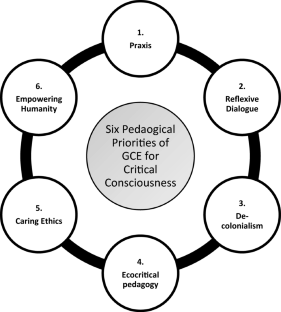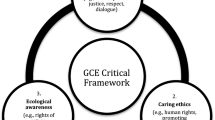Abstract
This article conceptualizes Global Citizenship Education (GCE) as a liberating and dynamic journey of consciousness-mobilization that supports students' critical thinking about how they can contribute to social justice. The authors’ conceptualization of GCE for critical consciousness is entrenched in the work of Paulo Freire. It is political because it is meant to shape the learner into an emancipated, ethical, and critical global citizen. As such, GCE for critical consciousness is based on six pedagogical priorities: praxis, reflexive dialogue, decolonialism, ecocritical views, caring ethics, and empowering humanity. These six priorities are not meant to be comprehensive; they are aimed at boosting debate on the key levers needed to place GCE on a plausible critical, ethical, and sustainable path. Hence, those priorities explicitly challenge and move beyond Western-European-centric and neoliberal GCE conceptions. The article ends with a call for further academic action to (re)construct the momentum needed to push for their implementation.

Similar content being viewed by others
References
Abram, D. (1999). A more than human world. In A. Weston (Ed.), An invitation to environmental philosophy (pp. 17–42). Oxford University Press.
Bosio, E. (2023). Global Citizenship education as a reflexive dialogic pedagogy. Citizenship Teaching & Learning, 18(2), 177–194. https://doi.org/10.1386/ctl_00119_1.
Bosio, E. (2023). Global South university educators’ perceptions of global citizenship education: Reflective dialogue, social change, and critical awareness. Prospects. https://doi.org/10.1007/s11125-023-09635-y.
Bosio, E., & Waghid, Y. (2023). Global citizenship education as a living ethical philosophy for social justice. Citizenship Teaching & Learning, 18(2), 151–158. https://doi.org/10.1386/ctl_00117_2.
Bosio, E., & Olssen, M. (2023). Critical global citizenship: Foucault as a complexity thinker, social justice and the challenges of higher education in the era of neoliberal globalization – A conversation with Mark Olssen. Citizenship Teaching & Learning, 18(2), 245–261. https://doi.org/10.1386/ctl_00123_1.
Bosio, E., & Waghid Y. (Eds.) (2022a). Global Citizenship Education in the Global South: Educators’ perceptions and practices. Brill
Bosio, E., & Waghid, Y. (2022b). Global citizenship education for critical consciousness development: The four pillars of de-colonialism, caring ethics, eco-critical views, and humanity empowerment. In E. Bosio and Y. Waghid (Eds.), Global citizenship education in the Global South (pp. 11–23). Brill. https://doi.org/10.1163/9789004521742_002
Bosio, E., & Waghid, Y. (2022c). Democratic pluralistic global citizenship education: Embracing educators’ voices from the Global South. In E. Bosio and Y. Waghid (Eds.), Global citizenship education in the Global South (pp. 284–294). Brill. https://doi.org/10.1163/9789004521742_015
Bosio, E., & Torres, C. A. (2019). Global citizenship education: An educational theory of the common good? A conversation with Carlos Alberto Torres. Policy Futures in Education, 17(6), 745–760. https://doi.org/10.1177/1478210319825517.
Bosio, E. (2020). Towards an ethical global citizenship education curriculum framework in the modern university. In D. Bourn (Ed.), Bloomsbury handbook for global education and learning (pp. 187–206). Bloomsbury.
Bosio, E. (Ed.) (2021a). Conversations on global citizenship education: Perspectives on research, teaching, and learning in higher education. Routledge
Bosio, E. (2021). Global human resources or critical global citizens? An inquiry into the perspectives of Japanese university educators on global citizenship education. Prospects. https://doi.org/10.1007/s11125-021-09566-6.
Bosio, E., & Schattle, H. (2021). Ethical global citizenship education: From neoliberalism to a values-based pedagogy. Prospects. https://doi.org/10.1007/s11125-021-09571-9.
Bosio, E., & Schattle, H. (2021b). Educação para a cidadania global ética: Do neoliberalismo a uma pedagogia baseada em valores [Education for ethical global citizenship: From neoliberalism to a value-based pedagogy]. Revista Educação Unisinos, Educação Unisinos, 26, 1–14. https://doi.org/10.4013/edu.2022.261.01.
Davids, N., & Waghid, Y. (2021). Academic activism in higher education: A living philosophy for social justice. Springer.
Dussel, E. (1977) Filosofıa etica de la liberacion [Ethical philosophy of education]. 3rd ed., vol. III. Niveles concretos de la etica latinoamericana. Ediciones Mega ́polis.
Dussel, E. (1996). Modernity, Eurocentrism, and trans-modernity: In Dialogue with Charles Taylor. In E. Mendieta (Ed.), The underside of modernity: Apel, Ricoeur, Rorty, Taylor, and the philosophy of liberation (pp. 129-59). Humanities.
Dussel, E. (2019). Epistemological decolonization of theology. In M. P. Joseph, V. Hsu, & P. H. Huang (Eds.), Wrestling with God in context: Revisiting the theology and social vision of Shoki Coe (pp. 46–63). Fortress.
Freire, P. (1973). Education for critical consciousness. Seabury.
Freire, P. (1994). Pedagogy of hope: Reliving pedagogy of the oppressed (R. R. Barr, Trans.). Continuum.
Freire, P. (2004). Pedagogia da tolerância. [Pedagogy of tolerance]. UNESP.
Giroux, H. A., & Bosio, E. (2021). Critical pedagogy and Global Citizenship Education. In E. Bosio (Ed.), Conversations on Global Citizenship Education: Perspectives on research, teaching, and learning in higher education (pp. 1-10). Routledge. Doi: https://doi.org/10.4324/9780429346897-1
hooks, b. (1984). Feminist theory from margin to center. South End Press.
hooks, b. (1989). Talking back: Thinking feminist, thinking black. South End Press.
Lomborg, B. (2003). The skeptical environmentalist: Measuring the real state of the world (Vol. 1). Cambridge University Press.
Lupinacci, J. (2017). Addressing 21st century challenges in education: An ecocritical conceptual framework toward an ecotistical leadership in education. Impacting Education: Journal on Transforming Professional Practice, 2(1).
Martusewicz, R., Edmundson, J., & Lupinacci, J. (2015). EcoJustice education: Toward diverse, democratic, and sustainable communities (2nd ed.). Routledge.
McLaren, P., & Bosio, E. (2022). Revolutionary critical pedagogy and critical global citizenship education: A conversation with Peter McLaren. Citizenship Teaching & Learning, 17(2), 165–181. https://doi.org/10.1386/ctl_00089_1.
Mignolo, W. (2000). Local histories/global designs: Coloniality, subaltern knowledges, and border thinking. Princeton University Press.
Mignolo, W. D., & Walsh C. E. (2018). On decoloniality. Concepts, analytics, praxis. Duke University Press.
Stein, S., & Andreotti, V. (2021). Global citizenship otherwise. In E. Bosio (Ed.), Conversations on Global Citizenship Education (pp. 13–36). Routledge.
Torres, C. A., & Bosio, E. (2020a). Global citizenship education at the crossroads: Globalization, global commons, common good, and critical consciousness. Prospects, 48, 99–113. https://doi.org/10.1007/s11125-019-09458-w.
Torres, C. A., & Bosio, E. (2020). Critical reflections on the notion of global citizenship education. A dialogue with Carlos Alberto Torres in relation to higher education in the United States. Encyclopaideia, 24(56), 107–117.
Veugelers, W., & Bosio, E. (2021). Linking moral and social-political perspectives in global citizenship education: A conversation with Wiel Veugelers. Prospects. https://doi.org/10.1007/s11125-021-09576-4.
Waghid, Y. (2021). Cultivating global citizenship education and its implications for education in South Africa. In E. Bosio (Ed.), Conversations on Global Citizenship Education (pp. 62–72). Routledge.
Weintraub, L., Phillips, P. C., Smith, S., Godfrey, D., Vesna, V., Rosenthal, A., Haynes, D. J., Kochhar-Lindgren, K., Burns, D., Higgins, H., & Bower S. (2006). Forum: Eco-tistical art. Art Journal, 65(1), 54–81.
Author information
Authors and Affiliations
Corresponding author
Additional information
Publisher's Note
Springer Nature remains neutral with regard to jurisdictional claims in published maps and institutional affiliations.
About this article
Cite this article
Bosio, E., Waghid, Y. Cultivating students' critical consciousness through global citizenship education: Six pedagogical priorities. Prospects (2023). https://doi.org/10.1007/s11125-023-09652-x
Accepted:
Published:
DOI: https://doi.org/10.1007/s11125-023-09652-x




